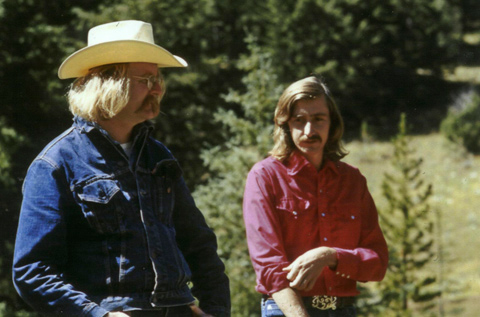
GRAND AND SORDID His novel Trout Fishing in America propelled Brautigan (left, with biographer
William Hjortsberg) to Time-cover fame and crazy dough. |
Richard Brautigan (1935-1984) came of age as a writer in Beat Generation San Francisco, but he was no beatnik. Hippies embraced his poetry and novels, especially Trout Fishing in America (1967), and he was seen by some inattentive journalists as a spokesman for that generation. Brautigan — as William "Gatz" Hjortsberg's 852-page whale of a biography shows — abhorred hippies. He belonged to a smaller American tribe: high-functioning alcoholic artists.
Brautigan out-roared Hart Crane and out-Hemingwayed Hemingway. Faulkner, Pollock, De Kooning, and Kerouac were not in his league. According to Hjortsberg — he is exhausting in this regard — Brautigan spent the last 15 years of his life drunk or hung over. All of these artists committed slow-motion suicide — like Hemingway, Brautigan finished himself off with a gun.
Hjortsberg, who was a friend of Brautigan's and a fellow member of the "Montana Gang" — Jim Harrison, Tom McGuane, and other outdoorsmen of great thirst — reports (in detail that will numb some readers) Brautigan's shit-faced, loutish behavior that, in the end, drove all who knew him away. He died alone in his Bolinas, California, house —not to be found for several weeks.
Jubilee Hitchhiker is a sad book, but it is not a cautionary tale. Brautigan succumbed to fame and money and alcohol. His life will cause no artist to swear off any of these.
Born in 1933, Brautigan's childhood in the Pacific Northwest was dirt poor and transient. He was a loner early on and he remained one. He liked solitude — writers have to like solitude — and he was a born drifter and observant list-maker. He loved writing and — after a slow start — women, guns, trout fishing, and all-night calvadosbourbonvodkaginwine sessions on the town in San Francisco and Tokyo. He loved Bozeman, Montana, cheap hotel rooms, small spiral notebooks, and many — writers and others — liked or loved him until he made it impossible for them.
I spent a half-dozen nights in his company just before Trout Fishing shot him to fame — the cover of Time magazine! — and crazy dough. He was, as Hjortsberg and others describe him, gentle and fey, possessing an off-the-wall imagination that made an evening of watching TV sitcoms, glass in hand, good fun. He was a homegrown American surrealist, western-style like the jackalope.
In 1970 in San Francisco, I visited him at his Geary Street "museum" apartment. Three things struck me — he had a full bar of top-shelf drink; he had painted fish on the floor; and, in his room, across from his bed, stood a sort of altar: a step-ladder with copies of his books face-out on every rung. Make of it what you will; it's too loaded to parse.